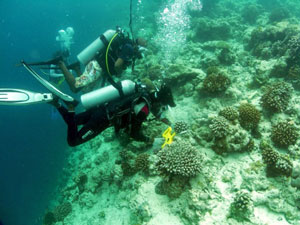Maldives is vulnerable to the adverse effects of climate change, including increases in sea level, sea surface temperature, ocean acidification and the frequency and intensity of droughts and storms. Australia has contributed $1 million to the Maldives Climate Change Trust Fund, joining with other donors to establish the Maldives Climate Change Trust Fund to build resilience to climate change in the Maldives and support sustainable economic development.
In a ceremony on Malé on 19 September 2012, the Government of Maldives, the World Bank, the European Union and AusAID launched three new projects under the Maldives Climate Change Trust Fund.
The projects will be implemented by the Government of Maldives' Ministry of Environment and Energy over the next two years.
The Clean Energy for Climate Mitigation project will provide 300 MWh annually of renewable energy through solar photovoltaic systems and energy efficiency measures to 7000 inhabitants on Gaafu Dhaalu Atoll. 'Independence from carbon-based fuels, if achieved through energy efficiency improvements and use of indigenous renewable energy resources has important energy security co-benefits as it will avoid fossil fuel imports that cost Maldives 20 per cent of its GDP, annually', said Dr Mariyam Shakeela, Minister of Environment and Energy.
The Wetlands Conservation and Coral Reef Monitoring project will benefit 22,000 inhabitants of three atolls, enabling the local governments to implement strategies for wetland and drainage management, ecotourism and community rainwater harvesting. This project will also partner with tourist resorts in the North and South Malé Atolls for coral reef monitoring to support conservation management decisions.
The Ari Atoll Solid Waste Management Pilot will help to manage solid waste generated in selected inhabited islands of the Ari Atoll and reduce the environmental risks to marine habitats of greenhouse gas emissions. Five waste management centres will be piloted with a view to scaling up an integrated solid waste management system in the inhabited islands and resorts of Ari Atoll.
These three projects align with the government's decentralisation framework and will build on public-private partnerships. If successful, these projects could be scaled-up and replicated across the country.
'With the country's high dependence on a few key environmental assets and as pressure on these assets rises, prudent economic management calls for strengthened stewardship on climate change and environmental sustainability', said Diarietou Gaye, Country Director of the World Bank to the Maldives.

